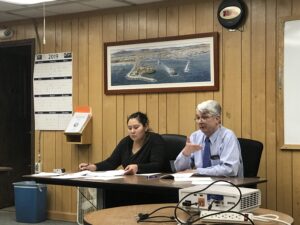Alaska’s Mandatory Child Abuse Reporting Statue took effect at the beginning of this month [Sept. 1st]. Kawerak’s mandated reporter says this law change is a positive adjustment, but more should be done to protect abused children.
With this change in place, mandated reporters in Alaska now have to report instances of sexual abuse both to the Office of Children Services’ (OCS) and local law enforcement.
According to a statement from the Department of Public Safety, the goals of this statute are to eliminate time between when a report is made and the actions to the incident that follows.
Jennifer Dean-Johnson, a forensic interviewer and educator, from Kawerak’s Child Advocacy Center (CAC) says reporting to OCS takes time.
“OCS has a general intake and they have to do a report, then they have to send it on to the appropriate office who can handle that, and they have to have somebody who can go out [to] follow up on that report.”
Dean-Johnson says this new statute will also shorten law enforcement’s response times in addressing allegations of sexual abuse.
“Whereas a report made directly to law enforcement there’s fewer steps, and they can immediately get out to that child to make sure that the immediate safety of the child is taken care of.”
However, there is still much to be done to better protect abused children in Western Alaska. Dean-Johnson explains another challenge she faces in her work.
“I would love for children to be able to report and be part of the CAC process without having to have consent from a parent or OCS. I believe that there are children out there that are hindered by that because if you have a parent that is their perpetrator, they’re not going to consent for that child to go through the process if it is going to incriminate them.”
In the Department of Public Safety’s (DPS) press release on this statute they stated the department, “will continue to collaborate with other agencies, whether it be through training opportunities or other initiatives, to hold offenders accountable and to support victims and survivors of abuse.”
For reporting instances of abuse please refer to this mandated reporting map and call OCS’s reporting number at 1-800-478-4444.
image at top: The Nome AST Post shares space in the Alaska National Guard Armory on Front Street in Nome. Photo from Emily Hofstaedter, KNOM (2019).





